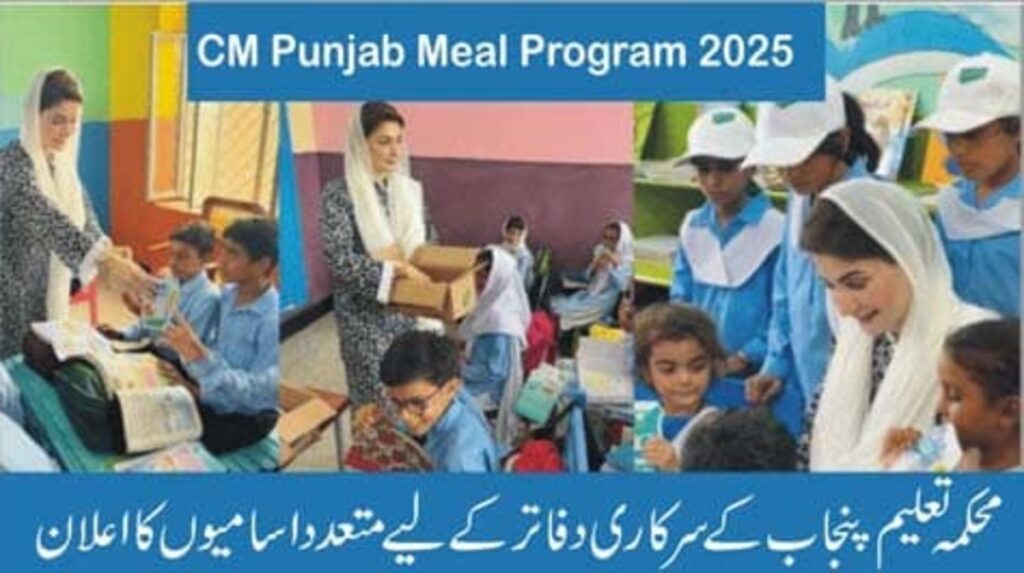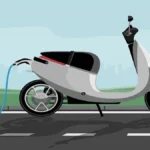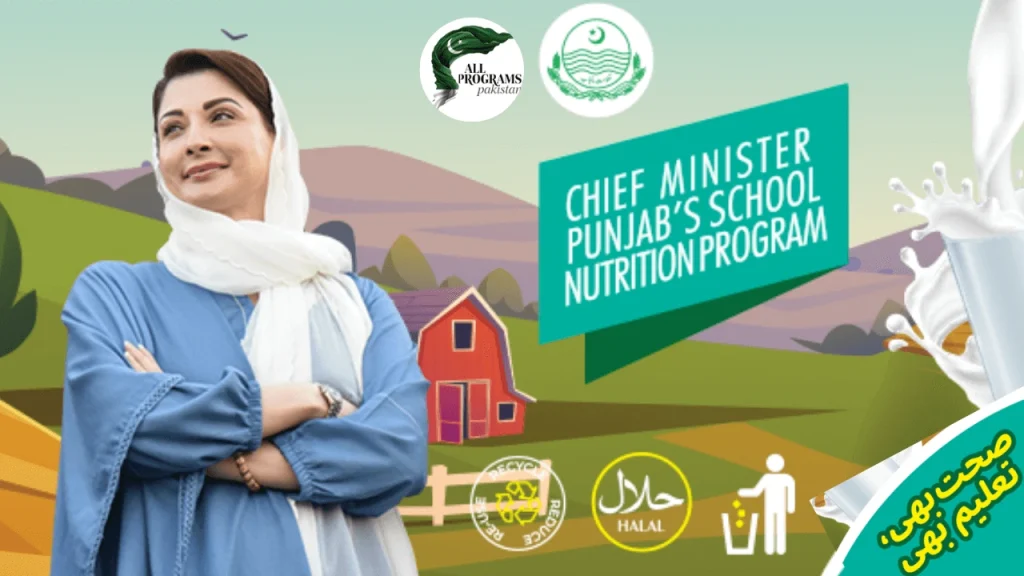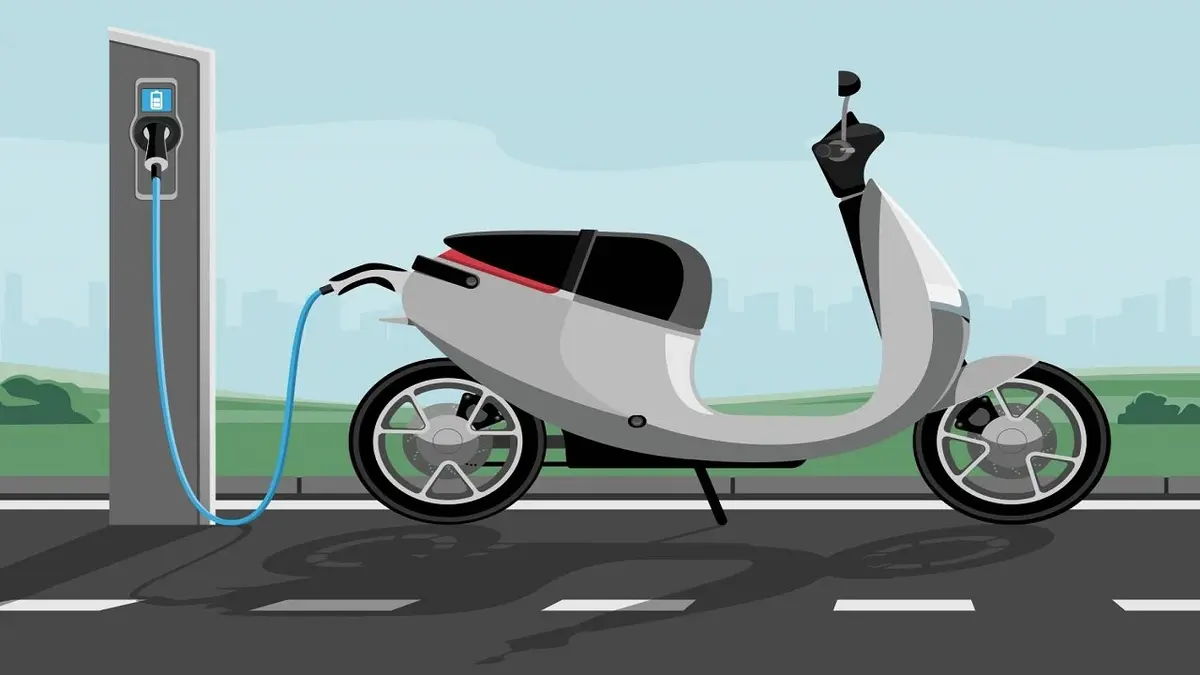CM Punjab School Meal scholarship Scheme 2025 delivers daily, nutritious meals so children eat better, learn faster, and attend more regularly. It’s a simple, high-impact way to reduce short-term classroom hunger and lift outcomes—especially in early grades.

CM Punjab School Meal Scheme is a targeted school-feeding initiative that focuses on primary students. In Punjab’s districts (Dera Ghazi Khan, Rajanpur, Muzaffargarh), grades 1–5 receive milk every school day; in Karachi’s Malir district (Sindh), selected schools serve hot meals. The goal: improve nutrition, attendance, concentration, and test performance while supporting community welfare through recycling efforts.
Coverage & Key Stats (2025)
Punjab currently runs a milk-based model for early graders. Through the CM Punjab School Meal Scheme, each child in grades 1–5 receives a 175 ml milk packet daily. Empty packets are collected, recycled, and proceeds go to school welfare projects—an elegant loop that reduces waste and funds repairs and supplies.
Karachi’s Malir program serves hot meals to about 11,000 students, supported by the Government of Sindh with technical backing from international partners. Together, these approaches serve distinct local needs while pursuing the same outcome: healthier, more engaged learners.
Quick Comparison
| Province | Districts/Cities | Target Grades | Program | Daily Provision | Scale | Funding/Partners | Extra Notes |
|---|---|---|---|---|---|---|---|
| PunjabPublic transportation | DG Khan, Rajanpur, Muzaffargarh | 1–5 | CM Punjab School Meal Scheme | 175 ml milk | 3,500+ schools; 400k+ kids | Govt. of Punjab | Recycling funds school welfare |
| Sindh | Karachi (Malir) | Primary | School meal program | Hot meals | ~11,000 students | Govt. of Sindh (+ technical partners) | Focus on attendance & learning |
Why the CM Punjab School Meal Scheme Matters
CM Punjab School Meal Scheme addresses micronutrient gaps that sap energy, attention, and memory in young learners. When breakfast is scarce at home, a dependable school meal stabilizes energy levels, reduces tardiness, and helps teachers teach instead of managing hunger. Over time, schools see better concentration spans, improved test scores, and higher promotion rates – especially in low-income communities.
Benefits you can measure
- Higher attendance and punctuality
- Better focus, memory, and classroom behavior
- Equity boost for learners from food-insecure households
- Community gains via recycling proceeds reinvested in school needs

How It Works
Under the CM Punjab School Meal Scheme, local teams coordinate daily deliveries, ensure safe handling, and track servings per class. In Punjab, used milk packets are collected for recycling; proceeds are earmarked for school welfare (e.g., minor repairs, classroom supplies). In Malir, kitchens or caterers follow hygiene guidelines and portion standards. District education officers and partners monitor quality, safety, and coverage to keep the pipeline reliable.
- Israeli troops arrest Senator Mushtaq following Gaza flotilla attack
- Gold prices reach new high in Pakistan – October 1, 2025
- Gold hits record high 2025
- Qatar announces Gaza plan meeting to be held with Hamas, Turkey
- Pakistan initiates first sovereign platform to mobilize green and social funding
CM Punjab School Meal scholarship Scheme 2025
Parent notes
- Eligibility: Children enrolled in participating government primary schools
- Cost: Free for eligible students
- Food safety: Hygiene and nutrition standards apply; periodic monitoring is conducted
What It Means for Teachers & Schools
- Fewer disruptions: Fed students settle faster, allowing more teaching minutes
- Better classroom climate: Reduced irritability, improved peer interactions
- Data to drive decisions: Attendance and performance indicators help optimize menus and delivery schedules
Conclusion
A dependable school meal is one of the fastest ways to level the playing field in education. From daily milk in Punjab to hot meals in Malir, the program lifts attendance, concentration, and results – while recycling amplifies community impact. If your school is covered, make sure your child participates and benefits from the CM Punjab School Meal
FAQs
Q1. Is my child eligible for the CM Punjab School Meal Scheme?
Yes – if the child attends a participating government primary school in covered Punjab districts (or a listed school in Karachi Malir for hot meals)
Q2. Do all grades receive meals?
Priority is grades 1–5. Expansion depends on resources and district planning.
Q3. Is there any registration or fee?
No separate sign-up; inclusion happens through the school. There is no fee for eligible students.
Q4. What about quality and hygiene?
Meals follow provincial nutrition and hygiene standards with periodic checks and technical guidance where applicable.
Q5. How does recycling support schools?
In Punjab, empty milk packets are recycled; proceeds fund school welfare projects like minor repairs and supplies.















